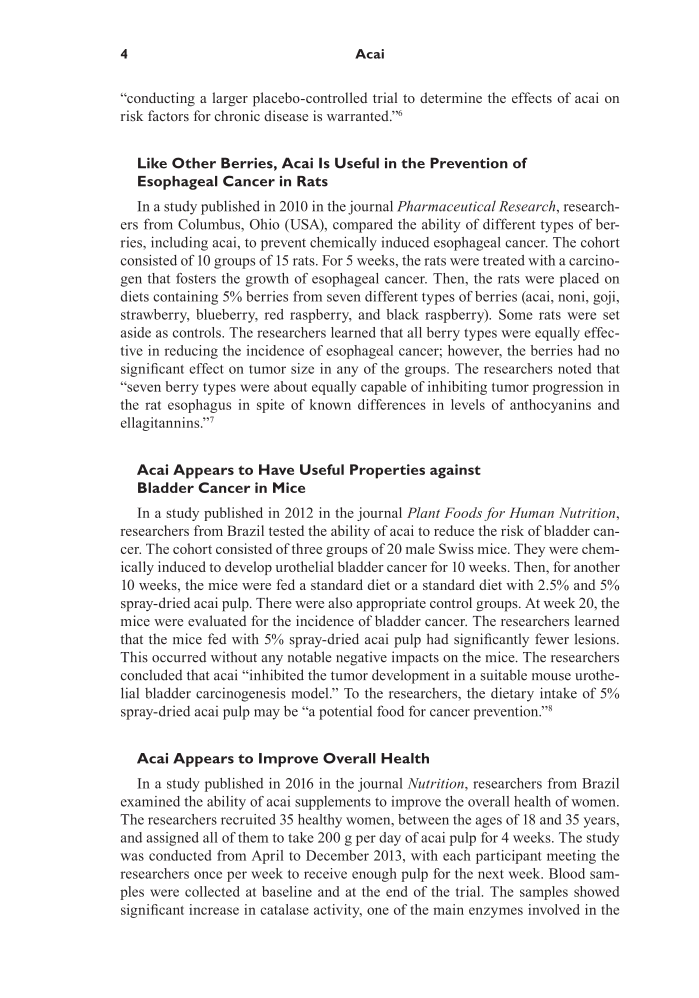4 Acai “conducting a larger placebo-controlled trial to determine the effects of acai on risk factors for chronic disease is warranted.”6 Like Other Berries, Acai Is Useful in the Prevention of Esophageal Cancer in Rats In a study published in 2010 in the journal Pharmaceutical Research, research- ers from Columbus, Ohio (USA), compared the ability of different types of ber- ries, including acai, to prevent chemically induced esophageal cancer. The cohort consisted of 10 groups of 15 rats. For 5 weeks, the rats were treated with a carcino- gen that fosters the growth of esophageal cancer. Then, the rats were placed on diets containing 5% berries from seven different types of berries (acai, noni, goji, strawberry, blueberry, red raspberry, and black raspberry). Some rats were set aside as controls. The researchers learned that all berry types were equally effec- tive in reducing the incidence of esophageal cancer however, the berries had no significant effect on tumor size in any of the groups. The researchers noted that “seven berry types were about equally capable of inhibiting tumor progression in the rat esophagus in spite of known differences in levels of anthocyanins and ellagitannins.”7 Acai Appears to Have Useful Properties against Bladder Cancer in Mice In a study published in 2012 in the journal Plant Foods for Human Nutrition, researchers from Brazil tested the ability of acai to reduce the risk of bladder can- cer. The cohort consisted of three groups of 20 male Swiss mice. They were chem- ically induced to develop urothelial bladder cancer for 10 weeks. Then, for another 10 weeks, the mice were fed a standard diet or a standard diet with 2.5% and 5% spray-dried acai pulp. There were also appropriate control groups. At week 20, the mice were evaluated for the incidence of bladder cancer. The researchers learned that the mice fed with 5% spray-dried acai pulp had significantly fewer lesions. This occurred without any notable negative impacts on the mice. The researchers concluded that acai “inhibited the tumor development in a suitable mouse urothe- lial bladder carcinogenesis model.” To the researchers, the dietary intake of 5% spray-dried acai pulp may be “a potential food for cancer prevention.”8 Acai Appears to Improve Overall Health In a study published in 2016 in the journal Nutrition, researchers from Brazil examined the ability of acai supplements to improve the overall health of women. The researchers recruited 35 healthy women, between the ages of 18 and 35 years, and assigned all of them to take 200 g per day of acai pulp for 4 weeks. The study was conducted from April to December 2013, with each participant meeting the researchers once per week to receive enough pulp for the next week. Blood sam- ples were collected at baseline and at the end of the trial. The samples showed significant increase in catalase activity, one of the main enzymes involved in the
Document Details My Account Print multiple pages
Print
You have printed 0 times in the last 24 hours.
Your print count will reset on at .
You may print 0 more time(s) before then.
You may print a maximum of 0 pages at a time.
































































































































































































































































































































































